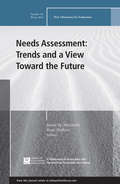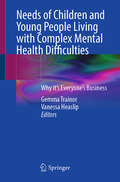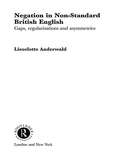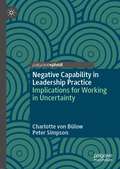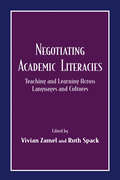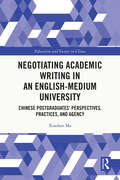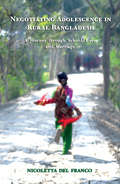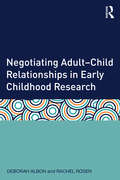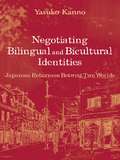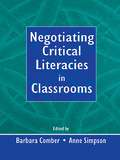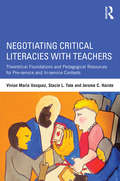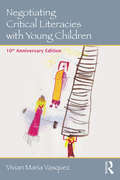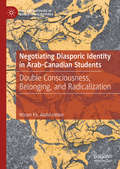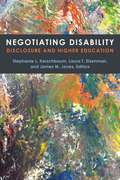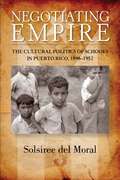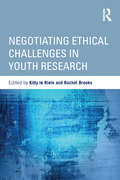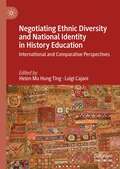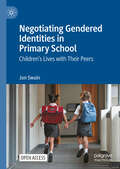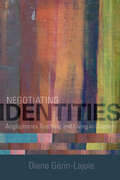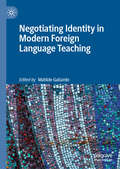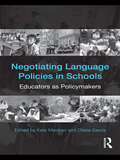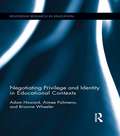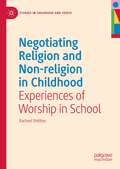- Table View
- List View
Needs Assessment: New Directions for Evaluation, Number 144 (J-B PE Single Issue (Program) Evaluation)
by Ryan Watkins James W. AltschuldExplore multiple practical and theoretical dimensions of needs assessment. This volume focuses exclusively on this essential topic for guiding decisions—examining subjects such as: the importance of defining needs, implementing assessments in public and private-sector organizations, aligning needs with assets and capacity assessments, how assessments factor into meaningful change at the organizational and society levels how to apply needs assessments in culturally diverse contexts conducting international needs assessments, and the impact of technologies on needs assessment methods. This issue will help professionals within public and private organizations conduct useful assessments, ones leading to results that can be applied in decisions. This is the 144th issue in the New Directions for Evaluation series from Jossey-Bass. It is an official publication of the American Evaluation Association.
Needs of Children and Young People Living with Complex Mental Health Difficulties: Why it’s Everyone’s Business
by Vanessa Heaslip Gemma TrainorThis book highlights how it is increasingly important that nurses and other health and social care professionals working with or caring for children and young people (CYP) can contribute to the care and support these vulnerable individuals need. Given the limited specialist mental health services available for CYP, this book helps to recognise when referral to specialist services is required. It is aimed at providing nurses, other health and social care professionals with a comprehensive understanding of some of the complex mental health issues faced by young people today and to provide them with confidence in how to interact helpfully with them. While covering a range of complex mental health issues (such as self-harm, eating disorders, and psychosis) this book also explores wider factors that can influence poor mental health (such as being Looked After, having a disability, drugs and alcohol, and social media). Alongside these, it explores some of the wider systems and processes that can provide practical guidance to practitioners (having a Trauma-informed approach, awareness of risk management, and safeguarding). Lastly, the book recognises how overwhelming it can be for practitioners working in this field and explores how they can use reflective practice and self-care in the development of a therapeutic relationship that enables them to interact positively and non-judgementally with young people with complex mental health issues. Examples of good practice are provided throughout the book by using case scenarios and tips from young people with lived experience.This book will prove to be an invaluable guide to assist nurses, teachers, social workers, paramedics, health care assistants and police force in giving help and support to CYP.
Neel's Pumpkin (Miss Rhonda's Readers #Set Two)
by Rhonda LucadamoMeet Neel and the pumpkins he grows.
Negation in Non-Standard British English: Gaps, Regularizations and Asymmetries (Routledge Studies in Germanic Linguistics #Vol. 8)
by Lieselotte AnderwaldDespite the advances of radio and television and increasing mobility and urbanization, spoken English is by no means becoming more like the written standard. English dialect grammar, however, is still a new and relatively undeveloped area of research, and most studies to date are either restricted regionally, or based on impressionistic statements. This book provides the first thorough empirical study of the field of non-standard negation across Great Britain.
Negative Capability in Leadership Practice: Implications for Working in Uncertainty
by Peter Simpson Charlotte von BülowWorking in uncertainty has become the new normal, but what do leaders have to draw upon when lacking the requisite knowledge? In this book, the authors make a case for Negative Capability, which enables leaders to work in a state of not knowing without simply reaching for old ideas or resorting to habitual behaviours. It is not a practice that can be measured, but its impact in leadership practice is immense and tangible. Offering fresh insights for leadership students, researchers, and practitioners on the challenges of working in uncertainty, the book offers a novel perspective on Negative Capability as a way of being. Each chapter explores an aspect of Negative Capability through the accounts of leaders and managers who had the courage to explore this way of being and share the stories about its powerful impact. Ultimately, this book explores how a practice of attention can lead to new ways of understanding the role of purpose, leisure, and passion in leadership practice.
Negotiating Academic Literacies: Teaching and Learning Across Languages and Cultures
by Ruth Spack Vivian ZamelNegotiating Academic Literacies: Teaching and Learning Across Languages and Cultures is a cross-over volume in the literature between first and second language/literacy. This anthology of articles brings together different voices from a range of publications and fields and unites them in pursuit of an understanding of how academic ways of knowing are acquired. The editors preface the collection of readings with a conceptual framework that reconsiders the current debate about the nature of academic literacies. In this volume, the term academic literacies denotes multiple approaches to knowledge, including reading and writing critically. College classrooms have become sites where a number of languages and cultures intersect. This is the case not only for students who are in the process of acquiring English, but for all learners who find themselves in an academic situation that exposes them to a new set of expectations. This book is a contribution to the effort to discover ways of supporting learning across languages and cultures--and to transform views about what it means to teach and learn, to read and write, and to think and know. Unique to this volume is the inclusion of the perspectives of writers as well as those of teachers and researchers. Furthermore, the contributors reveal their own struggles and accomplishments as they themselves have attempted to negotiate academic literacies. The chronological ordering of articles provides a historical perspective, demonstrating ways in which issues related to teaching and learning across cultures have been addressed over time. The readings have consistency in terms of quality, depth, and passion; they raise important philosophical questions even as they consider practical classroom applications. The editors provide a series of questions that enable the reader to engage in a generative and exciting process of reflection and inquiry. This book is both a reference for teachers who work or plan to work with diverse learners, and a text for graduate-level courses, primarily in bilingual and ESL studies, composition studies, English education, and literacy studies.
Negotiating Academic Writing in an English-Medium University: Chinese Postgraduates’ Perspectives, Practices, and Agency (Education and Society in China)
by Xiaohao MaBuilding on a collection of students’ perspectives and narratives, Ma examines how non-native English speaking (NNES) students negotiate English academic writing (EAW) to reveal the general patterns and distinct routes in addressing challenges in higher education.With the significant expansion of internationalization and student mobility, the discourse on cross-border education and how NNES students navigate the high-stakes educational journey remain pertinent. This book presents an in-depth qualitative study that investigates how NNES students in an English-medium university negotiate the demands of EAW in postgraduate study. The research foregrounds NNES students’ experiences and provides a comprehensive understanding of how they perceive, experience, and address the challenges of EAW by focusing on a group of mainland Chinese students studying in Hong Kong. Key topics discussed include the impact of English as an academic lingua franca on non-native speakers, the roles of universities in supporting these students, and lessons of individuals addressing academic challenges.Written for NNES students, researchers and practitioners in higher education, including language professionals and other specialists in language teaching, this compelling text will also interest general readers of academic and linguistic literacy.
Negotiating Adolescence in Rural Bangladesh: A Journey through School, Love and Marriage
by Nicoletta Del FrancoThe book interrogates the experience of being young and becoming adult in rural Bangladesh, in a context of profound processes of socio economic change. Throughout South Asia, new educational opportunities and an increase in the age at which girls and boys get married are opening new spaces for young people to live the passage to adulthood. This book documents and describes the everyday reality of this changing gendered transition for young people in a rural area of South West Bangladesh. If focuses on three main areas that are central to young people's experience: those of college and student life, friendships and relationships with those of the same sex and across sexes and marriage and the issues involved in the choice of a marriage partner.
Negotiating Adult-Child Relationships in Early Childhood Research
by Deborah Albon Rachel RosenNegotiating Adult–Child Relationships in Early Childhood Research presents a substantive critique of technicist and neoliberal approaches to ethics through an exploration of the complicated and often ‘messy’ situations faced in negotiating relationships in research with children. Despite growing acknowledgement of their centrality, relationships between adult researchers and very young participants have been neglected and under-theorised, and in response, this book offers a comprehensive conceptualisation of adult–child research relationships through examination of questions, including: How do power and inequity impact on adult–child research relationships? What does it mean for relationships when researchers ‘intervene’ in the field? How do bodies matter in research relationships? What does an emphasis on relationships with young children mean for the research process? Drawing on data from their own research, the authors contend that relationships are part of a wider web of social relations and space–time configurations. They propose and develop a relational ethics of answerability and social justice, inspired by the work of Bakhtin and, in addition, explore the way material bodies come to matter, the ambiguity of consent in educator-research, and the risks and possibilities of research relationships. Chapters include innovative formulations of reciprocity, ‘sensing practices’, and political-ethical responsibility. This book contributes to current debates about research with young children, offering an incisive and thorough exploration of the importance of relationships to the research process. Relevant for international audiences, this book is essential reading for early childhood students and educators, researchers, and lecturers with an interest in research with children.
Negotiating Bilingual and Bicultural Identities: Japanese Returnees Betwixt Two Worlds
by Yasuko KannoThis book examines the changing linguistic and cultural identities of bilingual students through the narratives of four Japanese returnees (kikokushijo) as they spent their adolescent years in North America and then returned to Japan to attend university. As adolescents, these students were polarized toward one language and culture over the other, but through a period of difficult readjustment in Japan they became increasingly more sophisticated in negotiating their identities and more appreciative of their hybrid selves. Kanno analyzes how educational institutions both in their host and home countries, societal recognition or devaluation of bilingualism, and the students' own maturation contributed to shaping and transforming their identities over time. Using narrative inquiry and communities of practice as a theoretical framework, she argues that it is possible for bilingual individuals to learn to strike a balance between two languages and cultures. Negotiating Bilingual and Bicultural Identities: Japanese Returnees Betwixt Two Worlds: *is a longitudinal study of bilingual and bicultural identities--unlike most studies of bilingual learners, this book follows the same bilingual youths from adolescence to young adulthood; *documents student perspectives--redressing the neglect of student voice in much educational research, and offering educators an understanding of what the experience of learning English and becoming bilingual and bicultural looks like from the students' point of view; and *contributes to the study of language, culture, and identity by demonstrating that for bilingual individuals, identity is not a simple choice of one language and culture but an ongoing balancing act of multiple languages and cultures. This book will interest researchers, educators, and graduate students who are concerned with the education and personal growth of bilingual learners, and will be useful as text for courses in ESL/bilingual education, TESOL, applied linguistics, and multicultural education.
Negotiating Critical Literacies in Classrooms
by Anne Simpson Barbara ComberNegotiating Critical Literacies in Classrooms brings together accounts of educators who have sought to make a difference in the lives of their students through literacy education--from university classrooms in the United States, England, and South Africa, to policy and curriculum development in Singapore and Australia. Each chapter represents the results of extended research on classroom practice. The authors in this collection write as teachers. The literacy classrooms they explore range from the early years of schooling, to primary and secondary education, through to community and university sites. Although the volume is organized around different levels of education, clearly overlapping themes emerge across the chapters, including identity formation and textual practices, politicizing curriculum and textbook production, and changing the power relations in classroom talk around text. An overarching theme of this collection is the belief that there is no one generic, universal critical literacy--in theory or in practice. Rather, the authors reveal how a range of theories can serve as productive starting points for educators working on social justice agendas through the literacy curriculum, and, equally important, how particular critical literacy theories or pedagogies must be worked out in specific locations. In each of these accounts, educators explain how they have taken a body of theory and worked with and on it in classrooms. Their rich portrayals and narratives of classroom realities illustrate the unanticipated effects of pedagogies that emerge in specific contexts. Experiences from the classrooms have led them to revise theories that are central to critical literacy, including constructs such as "empowerment," "resistance," and "multiple readings." This collection documents what occurs when educators confront the difficult ethical and political issues that evolve in particular classroom situations. Negotiating Critical Literacies in Classrooms is appropriate as a text for courses in language and literacy education, and will be of broad interest to educational researchers, practitioners, and theorists. The practical classroom focus makes this book accessible and of interest to a wide range of teachers and an excellent resource for professional development. The international scope will appeal to a global educational readership.
Negotiating Critical Literacies with Teachers: Theoretical Foundations and Pedagogical Resources for Pre-Service and In-Service Contexts
by Jerome C. Harste Vivian Maria Vasquez Stacie L. TateHow can teacher educators engage pre-service and in-service teachers in learning about and framing their teaching from a critical literacy perspective? What does this mean? Why is it important? To address these questions, this book offers a theoretical framework and detailed examples, pedagogical resources, and insights into ways to build critical literacies with teachers in and out of school. Its unique contribution is to bridge critical literacy theory and teacher education. Participants in teacher education programs and professional development settings are often reminded of the need to build curriculum using children’s inquiry questions, passions and interests but generally this message is delivered only through telling (lectures) or showing (examples from other people’s classrooms). This book advances critical literary by explaining and illustrating how teacher educators can do much more—by creating opportunities for pre-service and in-service teachers to "live critical literacies" through experiencing firsthand what it is like to be a learner where the curriculum is built around teachers’ own inquiry questions, passions, and interests.
Negotiating Critical Literacies with Young Children: 10th Anniversary Edition (Language, Culture, and Teaching)
by Vivian Maria VasquezIn this innovative and engaging text, Vivian Maria Vasquez draws on her own classroom experience to demonstrate how issues raised from everyday conversations with pre-kindergarten children can be used to create an integrated critical literacy curriculum over the course of one school year. The strategies presented are solidly grounded in relevant theory and research. The author describes how she and her students negotiated a critical literacy curriculum; shows how they dealt with particular social and cultural issues and themes; and shares the insights she gained as she attempted to understand what it means to frame ones teaching from a critical literacy perspective. New in the 10th Anniversary Edition New section: "Getting Beyond Prescriptive Curricula, the Mandated Curriculum, and Core Standards" New feature: "Critical Reflections and Pedagogical Suggestions" at the end of the demonstration chaptesr New Appendices: "Resources for Negotiating Critical Literacies" and "Alternate Possibilities for Conducting an Audit Trail" Companion Website: narratives of ways in which the audit trail has been used as a tool for teaching and learning; resources on critical literacy including links to other websites and blogs; podcast focused on critical literacy and young children
Negotiating Diasporic Identity in Arab-Canadian Students: Double Consciousness, Belonging, and Radicalization (Palgrave Studies in Educational Futures)
by Wisam Kh. Abdul-JabbarThis book, framed through the notion of double consciousness, brings postcolonial constructs to sociopolitical and pedagogical studies of youth that have yet to find serious traction in education. Significantly, this book contributes to a growing interest among educational and curriculum scholars in engaging the pedagogical role of literature in the theorization of an inclusive curriculum. Therefore, this study not only recognizes the potential of immigrant literature in provoking critical conversation on changes young people undergo in diaspora, but also explores how the curriculum is informed by the diasporic condition itself as demonstrated by this negotiation of foreignness between the student and selected texts.
Negotiating Disability: Disclosure and Higher Education
by Stephanie L Kerschbaum Laura T Eisenman James M JonesDisability is not always central to claims about diversity and inclusion in higher education, but should be. This collection reveals the pervasiveness of disability issues and considerations within many higher education populations and settings, from classrooms to physical environments to policy impacts on students, faculty, administrators, and staff. While disclosing one’s disability and identifying shared experiences can engender moments of solidarity, the situation is always complicated by the intersecting factors of race and ethnicity, gender, sexuality, and class. With disability disclosure as a central point of departure, this collection of essays builds on scholarship that highlights the deeply rhetorical nature of disclosure and embodied movement, emphasizing disability disclosure as a complex calculus in which degrees of perceptibility are dependent on contexts, types of interactions that are unfolding, interlocutors’ long- and short-term goals, disabilities, and disability experiences, and many other contingencies.
Negotiating Empire
by Solsiree Del MoralAfter the United States invaded Puerto Rico in 1898, the new unincorporated territory sought to define its future. Seeking to shape the next generation and generate popular support for colonial rule, U. S. officials looked to education as a key venue for promoting the benefits of Americanization. At the same time, public schools became a site where Puerto Rican teachers, parents, and students could formulate and advance their own projects for building citizenship. In Negotiating Empire, Solsiree del Moral demonstrates how these colonial intermediaries aimed for regeneration and progress through education. Rather than seeing U. S. empire in Puerto Rico during this period as a contest between two sharply polarized groups, del Moral views their interaction as a process of negotiation. Although educators and families rejected some tenets of Americanization, such as English-language instruction, they also redefined and appropriated others to their benefit to increase literacy and skills required for better occupations and social mobility. Pushing their citizenship-building vision through the schools, Puerto Ricans negotiated a different school project-one that was reformist yet radical, progressive yet traditional, colonial yet nationalist.
Negotiating Ethical Challenges in Youth Research (Critical Youth Studies)
by Rachel Brooks Kitty Te RieleNegotiating Ethical Challenges in Youth Research brings together contributors from across the world to explore real-life ethical dilemmas faced by researchers working with young people in a range of social science disciplines. Unlike literature that tends to discuss youth research at an abstracted and exalted level, this volume aims to make the basic principles and guidelines of youth research more ‘real.’ By openly discussing actual challenges that researchers have experienced in the course of conducting their fieldwork or interpreting their findings, this collection provides the most authentic overview of the ethics of youth research available. A careful selection of chapters addresses a range of ethical challenges particularly relevant to contemporary youth researchers. Each chapter identifies an ethical issue that the author has personally experienced in his or her youth research, explains why this was a challenge or dilemma, outlines how the researcher responded to the challenge, and provides advice and draws out broader implications for youth researchers. The chapters are organized around three themes that capture core ethical challenges: power and agency, protection and harm prevention, and trust and respect. The result is a collection that is a rigorous and valuable resource to those embarking on research with young people for the first time as well as supporting the resolution of ethical challenges by more experienced researchers.
Negotiating Ethnic Diversity and National Identity in History Education: International and Comparative Perspectives
by Luigi Cajani Helen Mu Hung TingThis edited book explores the problems and challenges of negotiating the representation of ethnic minorities within history education. It investigates how states balance the (non-)acknowledgement of the reality of cultural or religious diversity, and the promotion of a point of convergence in history education to foster national identity. Shifting our attention away from the intractable challenges posed by post-conflict countries for reconciliation, the contributors draw attention to the need to explore ways to prevent or pre-empt conflicts and exclusion through history education, which could contribute to developing a more sustainable culture of peace. Drawing on a wide range of contexts and sources, this book asks how history education could contribute to forming critical, historically informed, and committed young citizens. The book will be of interest to students and academics working on themes such as nationalism, citizenship, ethnicity, history education, multicultural education, peace studies and area studies, as well as practitioners in the fields of history, social studies, civic or citizenship.
Negotiating Gendered Identities in Primary School: Children’s Lives with Their Peers
by Jon SwainThis open access book explores young children’s lives in their later years at primary school, from their own point of view. It focuses on how girls and boys experience life in their informal peer group and explores the dynamics of friendships and social hierarchies, identities and how time is spent outside of lessons, including the use of social media. The author interrogates how children make meanings: who they think they are, what it means to be a girl or a boy, and what forms of femininity and masculinity are most dominant. Findings are based on interviews conducted at a middle-class state school and a fee-paying preparatory school on the outskirts of London. The book will be of interest to students and scholars of primary education, schooling and gender, as well as primary school teachers both in the UK and internationally.
Negotiating Identities: Anglophones Teaching and Living in Quebec
by Diane Gerin-LajoieAs members of an official linguistic minority in Canada, Anglophone teachers living and working in Quebec have a distinct experience of the relationship between language and identity. In Negotiating Identities, Diane Gérin-Lajoie uses survey data and the life stories of Anglophone teachers to illustrate the social practices which connect them with their linguistic, cultural, and professional identities.Exploring the complexity of identity as a lived experience, Negotiating Identities demonstrates the strength of language as a political force in these educators' lives both in the classroom and outside it. Through comparisons with the other official linguistic minority in Canada, the Francophones, and particularly with Franco-Ontarians, this book tells the stories of Quebec's Anglophone teachers in their own words, providing a unique account of how these individuals make sense of their lives as residents of Quebec.
Negotiating Identity in Modern Foreign Language Teaching
by Matilde GallardoThis edited book examines modern foreign language teachers who research their own and others’ experiences of identity construction in the context of living and teaching in UK institutions, primarily in the Higher Education sector. The book offers an insight into a key element of the educational and socio-political debate surrounding MFL in the UK: the teachers’ voices and their sense of agency in constructing their professional identities. The contributors use a combination of empirical research and personal reflection to generate knowledge about MFL teachers’ identity that can enhance how they are perceived in the social and educational establishments and raise awareness of key issues affecting the profession. This book will be of particular interest to language teachers, teacher trainers, applied linguists and students and scholars of modern foreign languages.
Negotiating Language Policies in Schools: Educators as Policymakers
by Kate MenkenEducators are at the epicenter of language policy in education. This book explores how they interpret, negotiate, resist, and (re)create language policies in classrooms. Bridging the divide between policy and practice by analyzing their interconnectedness, it examines the negotiation of language education policies in schools around the world, focusing on educators’ central role in this complex and dynamic process. Each chapter shares findings from research conducted in specific school districts, schools, or classrooms around the world and then details how educators negotiate policy in these local contexts. Discussion questions are included in each chapter. A highlighted section provides practical suggestions and guiding principles for teachers who are negotiating language policies in their own schools.
Negotiating Privilege and Identity in Educational Contexts (Routledge Research in Education)
by Adam Howard Brianne Wheeler Aimee PolimenoRecent efforts emphasize the roles that privilege and elite education play in shaping affluent youths’ identities. Despite various backgrounds, the common qualities shared among the eight adolescents showcased in this book lead them to form particular understandings of self, others, and the world around them that serve as means for them to negotiate their privilege. These self-understandings are crucial for them to feel more at ease with being privileged, foster a positive sense of self, and reduce the negative feelings associated with their advantages – thus managing expectations for future success. Offering an intimate and comprehensive view of affluent adolescents’ inner lives and understandings, Negotiating Privilege and Identity in Educational Contexts explores these qualities and provides an important alternative perspective on privilege and how privilege works. The case studies in this volume explore different settings and lived experiences of eight privileged adolescents who, influenced by various sources, actively construct and cultivate their own privilege. Their stories address a wide range of issues relevant to the study of adolescence and the various social class factors that mediate adolescents’ educational experiences and identities.
Negotiating Religion and Non-religion in Childhood: Experiences of Worship in School (Studies in Childhood and Youth)
by Rachael ShillitoeThis book explores how and if the mandate for children to worship in schools can be justified within the context of declining church attendance and increasing nonreligious identification in British society. Shillitoe asks what place compulsory worship has in an increasingly diverse and plural society, and what the answer means for the relationship between religion, the secular, and education more broadly. Through in-depth ethnographic fieldwork from across three schools in southwest England, the book reveals how examining the significance of children’s experiences expands our understanding of both collective worship in schooling and religion in social life more broadly and demonstrates that adult-centric anxieties and assumptions in this area do not always reflect the experiences of children.
